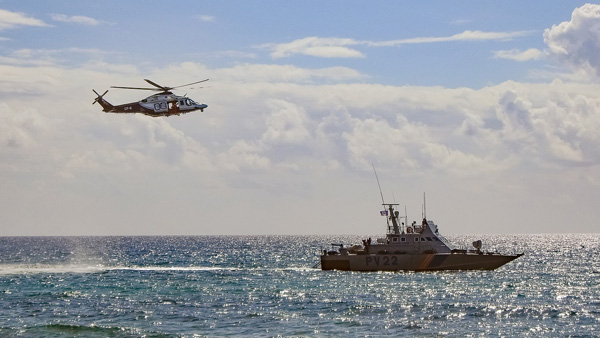Stranded U.S. Mariners rescued from Pacific Island

[The U.S. Coast Guard and Navy. Photo Credit to Pixabay]
On April 9, 2024, the U.S. Coast Guard
and Navy collaborated with regional partners in Guam and the Federated States
of Micronesia (FSM) to rescue three U.S. mariners who were stranded on the
island of Pikelot Atoll in Yap State, FSM.
The rescue effort began on April 6,
prompted by a concerned relative who reported that the mariners had failed to
return from a fishing expedition that began on March 31.
Following the distress call, Guam’s
Joint Rescue Sub-Center notified the U.S. government.
The U.S. Navy responded to the urgent
situation by deploying a P-8 aircraft crew from Kadena Air Force Base in Japan.
The U.S. military joined the FSM’s
initial search and the two nations searched over 78,000 square nautical miles.
The breakthrough came on April 7 when
the U.S. Navy Poseidon aircraft spotted a distress signal made from palm leaves
spelling out “HELP” on Pikelot Atoll, which led to the discovery of the
stranded mariners.
Miraculously, the men had managed to
survive for seven days by consuming coconut meat.
Despite their ordeal, none of the
soldiers sustained any severe injuries and only suffered minimal dehydration.
The Poseidon crew swiftly deployed
survival packs to replenish the men and a Hercules aircraft gave them a radio
to establish a communication line between the mariners and the search
party.
Using the radio, the stranded
explained that they had gotten stuck on the island during their fishing trip
when their skiff battery died and they were forced to dock.
On April 9, the United States Coast
Guard Cutter (USCGC) Oliver Henry and several Guam mariners brought the men
safely back to land.
Captain Nicholas Simmons, a commander
in the U.S. Coast Guard Forces Micronesia/Sector Guam, noted that this
incident “reinforces the strong bonds of friendship and cooperation
between the United States and the FSM and with our DoD partners”.
The aforementioned tie between the two
nations traces back to 1947, following World War II, when the United States
assumed trusteeship over the Trust Territory of the Pacific Islands, which
included FSM.
The Compact of Free Association
(COFA), established in 1985, further solidified this partnership, affirming the
U.S.’s commitment to provide defense and financial aid to FSM, along with Palau
and the Republic of the Marshall Islands (RMI).
However, recent challenges have
surfaced, notably delays in Congress’s approval of the COFA defense budget.
This past May, Hilda Heine, the
president of RMI, said in a televised speech that the U.S. was “gradually destroying” its connection with her country due
to “party politics in the US Congress”.
Similarly, a group of 48 bipartisan
legislators from member nations of COFA cautioned that the failure to pass
crucial legislation could inadvertently strengthen China’s influence in the
region, as evidenced by significant Chinese investments in the Pacific Islands.
Yet, despite these hurdles, the
enduring bonds between the U.S. and COFA member nations remain resilient.
President Heine affirmed in her speech
that the COFA nations remain the U.S.’s most reliable ally and highlighted the
enduring strength of the alliance.
Furthermore, the pandemic and recent
recessions have decreased Chinese international investments thus limiting the
influence of the Chinese government in the Pacific, reaffirming the pivotal
role of COFA nations as America’s steadfast allies.

- Hanah Park / Grade 10 Session 4
- Imagine International Academy of North Texas

![THE HERALD STUDENT REPORTERS [US]](/assets/images/logo_student_us.png)
![THE HERALD STUDENT REPORTERS [Canada]](/assets/images/logo_student_ca.png)
